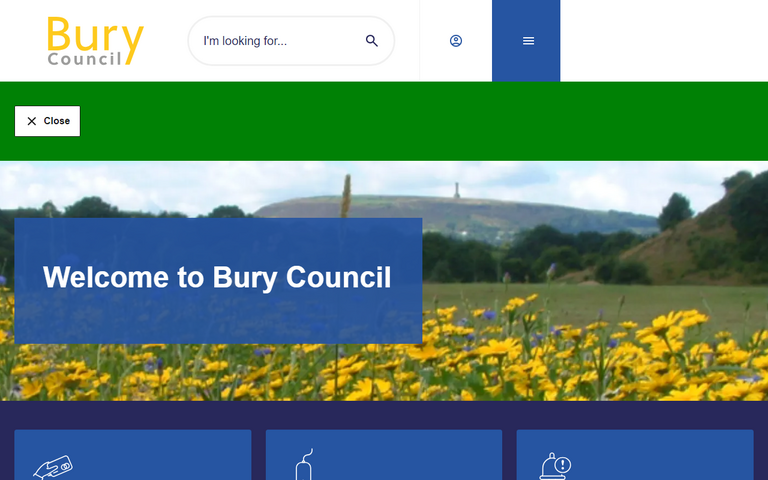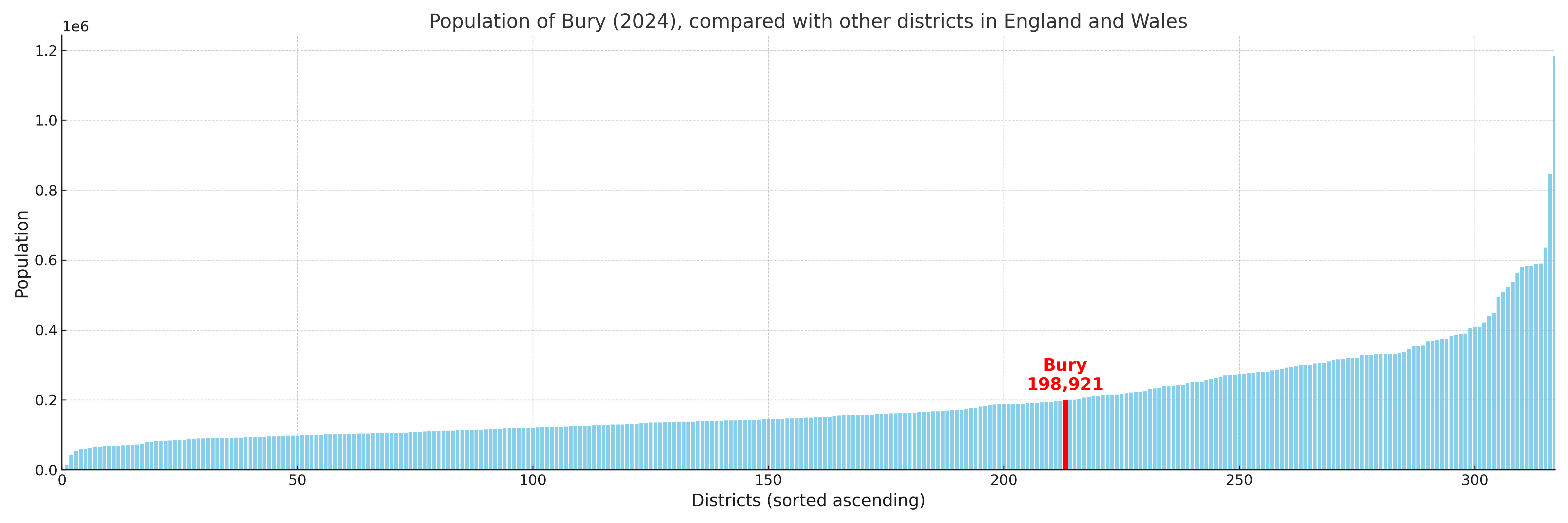Bury
§ This page gives an overview of the Bury local authority district, bringing together key facts, maps, and data to help you quickly understand the area. This is one of 361 LAD profiles on Baseview.
Overview ⁞ Bury lies north of Manchester, with a town centre known for its historic market, The Rock shopping district, and cultural attractions like Bury Art Museum. The East Lancashire Railway, a heritage line running through the Irwell Valley, adds to the area’s character, with Ramsbottom and Summerseat providing charming villages along the route. Peel Tower on Holcombe Hill overlooks the district, with wide views across Lancashire and Greater Manchester. Parks, rivers, and wooded valleys form part of its landscape, offering a mix of urban and rural scenery.
Bury Boundary Map
This map shows the official boundary of the Bury local authority district, based on the latest geographic data published by the Office for National Statistics (ONS). It provides a clear view of the district’s extent and helps you understand how the area fits within the wider regional and national landscape.
Contains OS data © Crown copyright and database right 2025. Source: Office for National Statistics licensed under the Open Government Licence v3.0.
The administrative boundary of Bury can also be viewed on OpenStreetMap: District Boundary of Bury.
Key Facts about Bury
What region is Bury in? Bury is in the North West of England, a region within the UK.
What county is Bury in? Bury is located in the county of Greater Manchester.
Is Bury a city? No, Bury is not a city. (Note: the UK has 76 officially designated cities.)
Who governs Bury? The local government for this district is: Bury Borough Council (Metropolitan District).
▶ Official website of Bury Borough Council 🔗 bury.gov.uk

Which police force covers Bury? Policing in Bury is provided by Greater Manchester Police 🔗 gmp.police.uk, which serves 10 local authority districts: Bolton ⁞ Bury ⁞ Manchester ⁞ Oldham ⁞ Rochdale ⁞ Salford ⁞ Stockport ⁞ Tameside ⁞ Trafford ⁞ Wigan.
Constituencies in Bury
Bury is divided into 2 parliamentary constituencies, listed below in alphabetical order.
A constituency is a specific geographical area that elects one Member of Parliament (MP) to represent them in the House of Commons. The United Kingdom is divided into 650 parliamentary constituencies. We have this list page for easy browsing of all UK parliamentary constituencies: List of Constituencies.
Wards in Bury
Bury is divided into 17 wards, listed below in alphabetical order.
- Besses
- Bury East
- Bury West
- Elton
- Holyrood
- Moorside
- North Manor
- Pilkington Park
- Radcliffe East
- Radcliffe North & Ainsworth
- Radcliffe West
- Ramsbottom
- Redvales
- Sedgley
- St. Mary's
- Tottington
- Unsworth
In the UK, a ward is a subdivision of a local authority area, used mainly for electoral and statistical purposes. Defined by the ONS, wards represent the primary unit for local elections, each returning one or more councillors to the local council. Wards are also used as a key geography for presenting population and census data. We have this list page for easy browsing of all electoral wards: List of all Electoral Wards in the UK.
Parishes in Bury
Bury is entirely unparished—there are no civil parishes in this local authority district.
Parishes are the lowest tier of local government; where they don’t exist, those very local services and representation sit directly with the principal council. We have this list page for easy browsing of all parishes: List of Civil Parishes in England and Wales.
Post Towns in Bury
Below is a list of post towns in Bury, grouped by postcode area:
BL ▸ Bury (BL0 / BL8 / BL9)
The UK postal hierarchy begins with broad postcode areas (such as “CB” or “M”), which are divided into smaller postcode districts (such as “CB8” or “M1”) to support accurate mail routing. Each postal address is anchored by a designated post town, the official locality name used in the UK postcode system, which operates independently from Local Authority Districts —the administrative boundaries used for council tax and local government services. Because they serve different purposes, a property’s postal address and its local authority district do not always align exactly.
Built-up Areas in Bury
Bury covers 15 built-up areas, listed below in alphabetical order.
- Ainsworth
- Bolton (Bolton) *
- Bury (Bury) *
- Edenfield *
- Heywood *
- Little Lever *
- Manchester *
- Prestwich *
- Radcliffe
- Ramsbottom *
- Rhodes *
- Salford *
- Simister
- Stubbins *
- Whitefield
In the UK, a Built-up Area (BUA) is a continuous urban area of at least 20 hectares (0.2 km²), defined by the ONS as land where buildings are generally no more than 200 metres apart, such as towns, cities, or large villages. (Note: A BUA name marked with an asterisk (*) indicates that the area is situated partly in the district of Bury.)
We have this list page for easy browsing of all built-up areas: List of all Built-up Areas in GB.
Bury compared with other districts in the UK
This section shows how Bury compares with other local authority districts in the UK, using a variety of measures and rankings.
Bury has 17 electoral wards.

Bury has a population of 198,921 (2024 mid-year estimate by ONS)

Population and Migration Trends in Bury
This chart shows the population trend for Bury from 2015 to 2024. It provides a quick overview of whether the local authority is growing, stable, or declining over time, and helps set context for the migration patterns shown below.
Population change is influenced by natural change (births minus deaths) and migration. The net migration chart below focuses on migration, separating internal migration (moves within the UK) from international migration (moves to and from abroad). Positive values indicate net inflows, while negative values indicate net outflows. The rate labels (per 1,000 residents) help compare migration intensity across years, even when the population size changes.
More local statistics and data for Bury can be found on the ONS statistics for Bury.